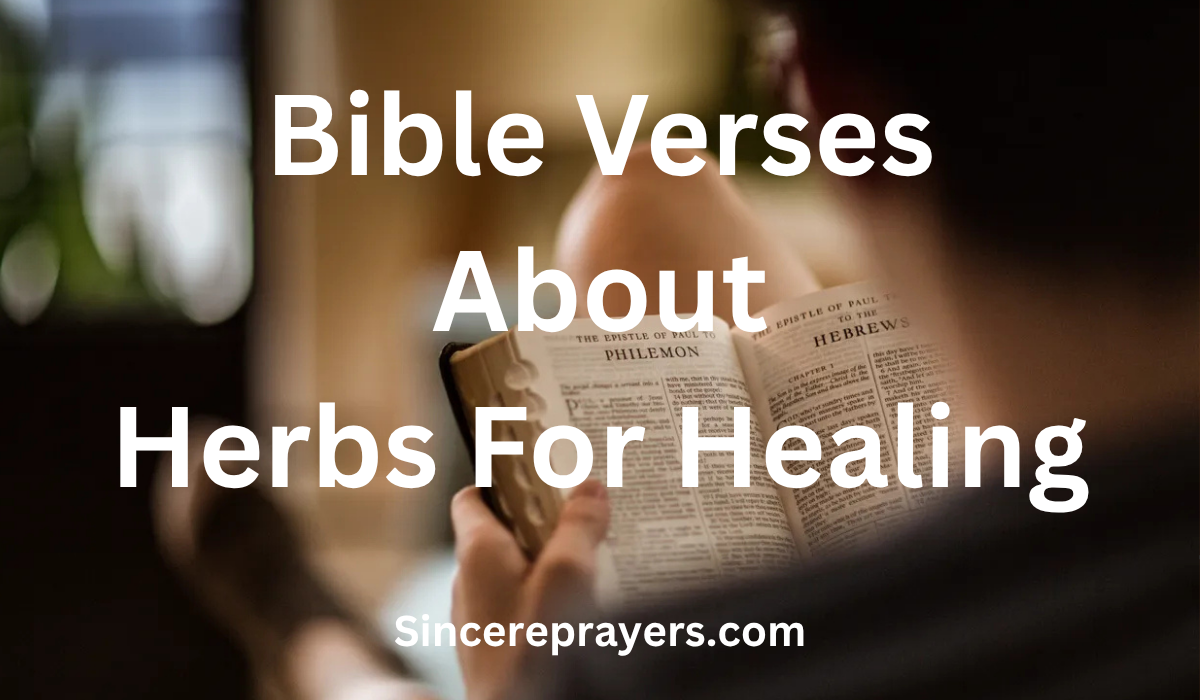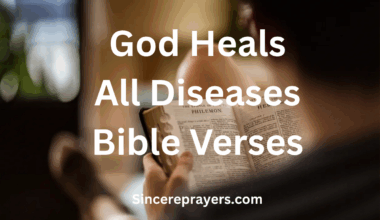God has supplied plants and herbs for human sustenance and healing since the beginning of creation. Throughout the Bible, herbs are connected to healing, purification, and restoration in addition to sustenance. As a reminder that God incorporated healing resources within creation itself, ancient cultures frequently used natural cures, many of which are mentioned in the Bible. These herbal scriptures demonstrate how God’s sustenance encompasses both physical and spiritual well-being.
Herbs are described in the Bible as a component of God’s plan to support life. These bible verses about herbs for healing consistently depicts divine healing through creation, from Genesis, when God provides plants for nourishment, to Revelation, where the leaves of the tree are used to heal nations. Herbs teach us that God’s care extends to all aspect of our lives and serve as a symbol for both spiritual and medical healing. Because of this, researching biblical herbs is both useful and profoundly spiritual.

Throughout the Bible, herbs were utilized for a variety of purposes, including medicinal, incense, anointing oil, and seasoning for meals. Every allusion has significance, demonstrating how God brought wholeness via His creation. Despite the advancements in modern medicine, many people still turn to herbal medicines for consolation, which is consistent with biblical knowledge. These words highlight God’s authority as the Great Physician by reminding us that He can restore health via both natural and supernatural means.
We are reminded as we consider these potent texts that herbs are more than just plants; they are also tools for heavenly healing. Herbs symbolize God’s desire for humankind to flourish in body, soul, and spirit, whether they are employed for medicinal purposes, spiritual purification, or symbolic rites. This verses collection will inspire you to believe in God’s healing power, accept His provision, and view creation as an expression of His tender care.
35 Powerful Bible Verses About Herbs For Healing in 2025
1. Genesis 1:29
“Then God said, ‘I give you every seed-bearing plant on the face of the whole earth and every tree that has fruit with seed in it. They will be yours for food.’”
This verse highlights God’s original provision for humanity through plants and herbs. From the very beginning, He designed creation to sustain life. Herbs were given not only for nourishment but also for health, demonstrating God’s foresight in equipping His children with natural remedies. This verse reminds us that God’s creation is sufficient to provide healing, showing His care for both our physical and spiritual well-being.
2. Genesis 9:3
“Everything that lives and moves about will be food for you. Just as I gave you the green plants, I now give you everything.”
After the flood, God reaffirmed His provision to Noah and his descendants. Green plants and herbs were included in His abundant supply. This verse shows that herbs are part of God’s gracious design to provide health, sustenance, and healing. It reassures us that the natural resources given by God are to be received with gratitude, reflecting His continuous care for humanity through every generation.
3. Exodus 15:26
“He said, ‘If you listen carefully to the Lord your God and do what is right in his eyes, if you pay attention to his commands and keep all his decrees, I will not bring on you any of the diseases I brought on the Egyptians, for I am the Lord, who heals you.’”
Here, God reveals Himself as the ultimate healer. While herbs and plants serve as tools of healing, true restoration comes from the Lord. His promise shows that obedience and faith bring health and protection. Herbs may be instruments of wellness, but they are most effective when aligned with God’s healing power. This verse teaches that physical remedies work best when paired with trust in the Great Physician.
4. Psalm 104:14
“He makes grass grow for the cattle, and plants for people to cultivate—bringing forth food from the earth.”
The psalmist praises God for His provision through the earth’s plants. Herbs, as part of this blessing, are not only for food but also for healing. This verse reminds us that all creation serves a divine purpose, bringing health and strength to humanity. Herbs are gifts from God, designed to restore and refresh our bodies. It’s a reminder to appreciate the natural remedies He has provided.
5. Ezekiel 47:12
“Fruit trees of all kinds will grow on both banks of the river. Their leaves will not wither, nor will their fruit fail. Every month they will bear fruit, because the water from the sanctuary flows to them. Their fruit will serve for food and their leaves for healing.”
This powerful vision emphasizes God’s ultimate plan for healing. The herbs and leaves symbolize divine provision for restoration. They serve as a reminder that God’s creation has both physical and spiritual healing purposes. Just as leaves bring physical healing, God’s Word brings spiritual wholeness. This verse connects herbs to God’s eternal plan, showing that healing is part of His nature and design for humanity.
6. Revelation 22:2
“On each side of the river stood the tree of life, bearing twelve crops of fruit, yielding its fruit every month. And the leaves of the tree are for the healing of the nations.”
This verse closes Scripture with the image of God’s ultimate healing through creation. The leaves symbolize divine restoration, showing that God’s provision includes both physical and spiritual renewal. Herbs and leaves remind us of His eternal plan for wholeness. This verse encourages us to see natural remedies not as coincidence, but as part of God’s design for complete healing and redemption for all nations.
7. Proverbs 15:17
“Better a small serving of vegetables with love than a fattened calf with hatred.”
This proverb highlights the value of herbs and vegetables in daily life. It shows that health and healing are not just physical but also relational. Herbs symbolize simplicity, nourishment, and peace. Even a modest herbal meal, when shared with love, holds more worth than a feast filled with strife. This verse teaches us that healing includes harmony in relationships, making herbs a symbol of wholesome living.
8. Proverbs 27:9
“Perfume and incense bring joy to the heart, and the pleasantness of a friend springs from their heartfelt advice.”
Though not directly about food, this verse reminds us that herbs used in perfume and incense bring refreshment and healing to the spirit. Just as herbs provide aroma and comfort, friendships provide counsel and encouragement. This verse links herbal remedies to emotional and spiritual wellness. It shows that healing extends beyond the body to the heart, and herbs can symbolize joy, renewal, and uplifting presence.
9. Isaiah 38:21
“Isaiah had said, ‘Prepare a poultice of figs and apply it to the boil, and he will recover.’”
This verse demonstrates a practical use of herbs for healing. God instructed Isaiah to use figs as medicine for King Hezekiah’s illness. It shows that God often uses natural remedies as instruments of His healing power. Herbs, like figs, are part of creation’s pharmacy, reminding us that God is the source of wisdom in health. This verse encourages us to value both prayer and practical remedies in the healing process.
10. Matthew 23:23
“Woe to you, teachers of the law and Pharisees, you hypocrites! You give a tenth of your spices—mint, dill and cumin. But you have neglected the more important matters of the law—justice, mercy and faithfulness.”
Here, herbs such as mint, dill, and cumin are used to reveal misplaced priorities. The Pharisees tithed herbs but ignored justice and mercy. This verse reminds us that while herbs are valuable in daily life and even spiritual rituals, true healing also involves the heart. Herbs may treat the body, but love and justice bring healing to the soul. God desires balance between outward practices and inward righteousness.
11. Mark 4:31–32
“It is like a mustard seed, which is the smallest of all seeds on earth. Yet when planted, it grows and becomes the largest of all garden plants, with such big branches that the birds can perch in its shade.”
Jesus uses the mustard seed—an herb—as a parable of faith. Herbs here symbolize growth and abundance. Just as the mustard plant begins small but becomes large, faith begins small and grows into strength. Herbs represent potential, healing, and nourishment in God’s kingdom. This verse encourages believers to see God’s work in small beginnings, trusting that His provision—whether herbs or faith—brings fullness and restoration over time.
12. Luke 11:42
“Woe to you Pharisees, because you give God a tenth of your mint, rue and all other kinds of garden herbs, but you neglect justice and the love of God. You should have practiced the latter without leaving the former undone.”
This verse highlights the spiritual use of herbs in offering. The Pharisees gave herbs but lacked love and justice. Herbs here remind us that God values heart-based obedience over ritual practices alone. While herbs are symbols of God’s provision, true healing requires a heart aligned with His love. This verse teaches balance—using herbs with gratitude, but never neglecting the deeper matters of justice, mercy, and compassion.
13. Romans 14:2
“One person’s faith allows them to eat anything, but another, whose faith is weak, eats only vegetables.”
Paul addresses dietary practices, mentioning herbs and vegetables as part of personal faith choices. This verse shows that herbs were a key part of ancient diets, symbolizing simplicity and purity. It reminds us that healing can come through natural, plant-based diets, but more importantly, that faith is central. God’s concern is not merely what we eat but the attitude of the heart. Herbs remind us of God’s sustaining provision.
14. Job 38:27
“To satisfy a desolate wasteland and make it sprout with grass?”
This verse portrays God as the One who makes herbs and plants grow even in barren places. Herbs symbolize God’s life-giving power, bringing healing where there was once desolation. Just as plants can revive dry land, God revives weary hearts. Herbs are reminders of His restorative hand over creation, providing not only food but also physical and spiritual healing to those in need.
15. Song of Solomon 4:14
“Nard and saffron, calamus and cinnamon, with every kind of incense tree, with myrrh and aloes and all the finest spices.”
This verse lists herbs and spices symbolizing beauty, fragrance, and healing. The Song of Solomon uses them to describe love and delight, but these herbs were also known for medicinal and spiritual purposes. Herbs here represent God’s gift of refreshment and health, bringing joy to both body and spirit. They remind us that healing includes restoration of relationships and beauty in life, reflecting God’s abundance and care.
16. Jeremiah 8:22
“Is there no balm in Gilead? Is there no physician there? Why then is there no healing for the wound of my people?”
The balm of Gilead was a famous herbal remedy known for healing. Jeremiah uses it metaphorically, asking why God’s people remain spiritually broken when healing is available. This verse reminds us that while herbs provide physical relief, true healing comes from turning to God, the Great Physician. Herbs may soothe, but lasting restoration is found in Christ, the balm that heals wounds of the soul.
17. 2 Kings 20:7
“Then Isaiah said, ‘Prepare a poultice of figs.’ They did so and applied it to the boil, and he recovered.”
This account mirrors Isaiah 38:21, where God uses natural remedies for King Hezekiah’s recovery. The poultice of figs demonstrates how herbs can serve as tools of God’s healing. It shows that God works through both spiritual power and physical means. Herbs are not random but divinely designed to promote health. This verse highlights the partnership between natural remedies and God’s miraculous hand in restoring life.
18. Deuteronomy 32:2
“Let my teaching fall like rain and my words descend like dew, like showers on new grass, like abundant rain on tender plants.”
This verse beautifully connects God’s Word to the nourishment of herbs and plants. Just as herbs flourish with water, our souls thrive through God’s Word. Herbs symbolize growth, renewal, and vitality. Healing is not only physical but also spiritual, as His teaching refreshes weary hearts. This verse encourages us to see herbs as metaphors of God’s sustaining grace, reminding us that His truth brings restoration like rain on tender plants.
19. James 5:14
“Is anyone among you sick? Let them call the elders of the church to pray over them and anoint them with oil in the name of the Lord.”
Though focused on oil, this verse connects to the healing use of natural substances. Oils were derived from plants and herbs, symbolizing God’s provision for health. Anointing with oil demonstrates the union of natural remedies and divine power. This verse reminds us that healing comes through prayer, community, and the resources God provides. Herbs, like oil, are part of God’s holistic plan for wellness and restoration.
20. Genesis 30:14
“During wheat harvest, Reuben went out into the fields and found some mandrake plants, which he brought to his mother Leah. Rachel said to Leah, ‘Please give me some of your son’s mandrakes.’”
Mandrakes were believed to have healing and fertility properties. This verse shows how herbs were valued for their perceived medicinal and restorative powers in ancient times. While their effect was debated, the story reflects how people turned to God’s creation for healing. Herbs like mandrakes remind us that God provides natural remedies, but ultimate power belongs to Him. Healing may come through both faith and natural resources.
21. Numbers 11:5
“We remember the fish we ate in Egypt at no cost—also the cucumbers, melons, leeks, onions and garlic.”
The Israelites recalled the herbs and vegetables of Egypt, which had both nutritional and medicinal value. Garlic and onions, in particular, were known for health benefits. This verse shows how herbs were essential to daily life and well-being. Even in longing, it reflects humanity’s deep connection with natural remedies. God reminds His people that He can provide abundantly, both spiritually and physically, beyond what they left behind in Egypt.
22. Matthew 13:31–32
“He told them another parable: ‘The kingdom of heaven is like a mustard seed, which a man took and planted in his field. Though it is the smallest of all seeds, yet when it grows, it is the largest of garden plants and becomes a tree, so that the birds come and perch in its branches.’”
The mustard seed parable emphasizes faith, but also highlights the power of herbs. From a tiny seed grows a mighty plant, symbolizing God’s kingdom and healing power. Herbs demonstrate how God works through small beginnings to bring great results. They remind us that natural remedies may seem simple, yet God can use them powerfully. This verse connects the growth of herbs to the flourishing of faith and life.
23. Isaiah 61:11
“For as the soil makes the sprout come up and a garden causes seeds to grow, so the Sovereign Lord will make righteousness and praise spring up before all nations.”
Herbs and plants symbolize God’s work of renewal and righteousness. Just as seeds sprout into herbs with healing and nourishment, God causes righteousness and praise to flourish in His people. Healing is not only about the body but also the soul. Herbs serve as a metaphor for God’s abundant life-giving work. This verse encourages us to trust God’s timing, as He causes growth and healing in due season.
24. Ezekiel 34:29
“I will provide for them a land renowned for its crops, and they will no longer be victims of famine in the land or bear the scorn of the nations.”
This promise points to God’s provision of abundant crops, which included herbs for food and healing. The land symbolizes restoration and security, where God’s people will have all they need. Herbs here represent God’s care and His desire to eliminate lack. Healing often begins with provision, and God assures His people of both sustenance and dignity. This verse is a reminder that God provides abundantly for health and restoration.
25. Revelation 22:1–2
“Then the angel showed me the river of the water of life, as clear as crystal, flowing from the throne of God and of the Lamb down the middle of the great street of the city. On each side of the river stood the tree of life, bearing twelve crops of fruit, yielding its fruit every month. And the leaves of the tree are for the healing of the nations.”
This powerful image again emphasizes the eternal significance of healing herbs and leaves. Flowing from God’s throne, the tree of life provides food and medicine for all. This verse reminds us that true healing is eternal, flowing from God Himself. Herbs symbolize God’s provision and His promise to restore nations. It assures us that God’s design for healing will be fully revealed in eternity.
26. Leviticus 25:7
“Your livestock and the wild animals in your land will also eat what the land produces.”
This verse highlights God’s provision through plants and herbs, not only for humans but also for animals. Herbs sustain life across creation, demonstrating God’s abundant care. Healing and nourishment come from the same source—the land God blesses. This verse reminds us that herbs are part of a divine ecosystem, sustaining both man and beast. God’s design ensures that everything in creation has the provision necessary for life and wellness.
27. Hosea 14:5–6
“I will be like the dew to Israel; he will blossom like a lily. Like a cedar of Lebanon he will send down his roots; his young shoots will grow. His splendor will be like an olive tree, his fragrance like a cedar of Lebanon.”
God uses plant imagery to describe renewal and healing for His people. Herbs and trees symbolize restoration, growth, and vitality. The fragrance mentioned ties to herbs used in worship and healing. This verse shows that God brings wholeness not only to the body but also to the spirit of His people. Just as herbs flourish with dew, so God refreshes us with His presence and healing power.
28. Isaiah 55:12–13
“You will go out in joy and be led forth in peace; the mountains and hills will burst into song before you, and all the trees of the field will clap their hands. Instead of the thornbush will grow the juniper, and instead of briers the myrtle will grow. This will be for the Lord’s renown, for an everlasting sign, that will endure forever.”
This prophetic vision highlights God’s transformation of creation. Herbs and plants replace thorns, symbolizing healing, peace, and renewal. God brings beauty where there was once brokenness, reminding us that His power restores both land and people. Herbs here represent life flourishing under God’s blessing, offering healing and abundance. This verse assures us that His restoration is both physical and spiritual, enduring as a testimony of His faithfulness.
29. Exodus 30:23
“Take the following fine spices: 500 shekels of liquid myrrh, half as much (that is, 250) of fragrant cinnamon, 250 shekels of fragrant calamus.”
God instructed Moses to prepare anointing oil using herbs and spices. These herbs carried healing, fragrance, and sanctification purposes. They were not just medicinal but also symbolic of God’s presence. This verse reminds us that herbs serve both practical and sacred roles, blending physical healing with spiritual consecration. God designed them to be vessels of His presence and instruments of blessing, emphasizing His holistic plan for wellness.
30. Matthew 6:28–29
“And why do you worry about clothes? See how the flowers of the field grow. They do not labor or spin. Yet I tell you that not even Solomon in all his splendor was dressed like one of these.”
Jesus points to the natural beauty of herbs and flowers to remind us of God’s provision. Herbs symbolize simplicity, care, and God’s detailed design. This verse teaches that just as God clothes the plants of the field with splendor, He also provides for our needs. Herbs reveal God’s nurturing heart, encouraging us to trust Him. Healing comes not just from remedies but from resting in His faithful provision.
31. 1 Kings 4:33
“He spoke about plant life, from the cedar of Lebanon to the hyssop that grows out of walls. He also spoke about animals and birds, reptiles and fish.”
This verse highlights Solomon’s wisdom in understanding plants and herbs. Hyssop, often used for cleansing and healing, is mentioned as an example of his vast knowledge. Herbs here represent knowledge, healing, and God’s design within creation. This verse shows that wisdom includes recognizing the healing power of herbs. It reminds us that God gives knowledge of natural remedies to benefit His people and glorify His creation.
32. Exodus 12:8
“That same night they are to eat the meat roasted over the fire, along with bitter herbs, and bread made without yeast.”
Bitter herbs were part of the Passover meal, symbolizing both remembrance and healing. They reminded Israel of suffering in Egypt but also of God’s deliverance. Herbs here hold symbolic and practical value, pointing to healing through remembrance of God’s salvation. This verse shows that herbs can serve as markers of God’s faithfulness, connecting physical health with spiritual lessons. Healing often includes remembering God’s past works of deliverance.
33. Psalm 147:8
“He covers the sky with clouds; he supplies the earth with rain and makes grass grow on the hills.”
This psalm celebrates God’s provision through nature. Herbs, grass, and plants grow because of His faithful care. Healing flows from His hand as He nurtures creation. This verse reminds us that herbs are not self-sustaining but depend on God’s rain and provision. Just as He causes plants to flourish, He restores our lives. Herbs testify to His sustaining power, teaching us to trust Him as our healer and provider.
34. Deuteronomy 8:8
“A land with wheat and barley, vines and fig trees, pomegranates, olive oil and honey.”
This verse describes the richness of the Promised Land, including herbs and plants with healing and nourishing properties. God’s blessing included abundance, health, and provision through the land’s produce. Herbs here represent not just survival but flourishing. This verse reminds us that God’s promises extend to physical wellness, as He provides nourishment and healing through His creation. His provision ensures that His people live in fullness and health.
35. Jeremiah 17:8
“They will be like a tree planted by the water that sends out its roots by the stream. It does not fear when heat comes; its leaves are always green. It has no worries in a year of drought and never fails to bear fruit.”
This verse illustrates stability and healing through imagery of flourishing plants. Herbs and trees by water symbolize strength, nourishment, and resilience. Just as herbs thrive with consistent water, we thrive when rooted in God’s presence. This verse shows that healing includes enduring strength, spiritual health, and fruitfulness. Herbs become metaphors of God’s sustaining grace, reminding us that those who trust Him will always find restoration and life.
Conclusion
Herbs are more than just plants, as the Bible makes plain. They are a component of God’s supernatural supply for restoration, health, and healing. Herbs are mentioned as tools for worship, medicine, sustenance, and symbolism in Genesis through Revelation. They serve as a reminder that God is concerned about every aspect of our lives and that His love extends to both our bodily and spiritual health. Herbs serve as a reminder that God created the world with healing in mind.
These lyrics also tell us that, despite their potency, herbs are not the only way to heal. As the Great Physician, God frequently channels His healing power through natural treatments. We can see herbs as instruments in God’s hand, just as Hezekiah was cured by a fig poultice and Israel was instructed to use herbs for remembrance. They demonstrate how basic, natural methods, along with prayer and trust in the Lord, are frequently the mechanism by which supernatural healing occurs.
Herbs ultimately lead us back to the Creator. True healing comes from God alone, even if we may profit from their restorative and curative properties. Revelation’s leaves for the nations’ healing serve as a reminder of God’s everlasting plan to make everything whole again. Christ is the ultimate healer who restores our spirits, but herbs are symbolic of His provision. Let’s embrace God’s promises and put our faith in Him to bring about physical, mental, and spiritual wholeness, just as we embrace herbs for healing.





